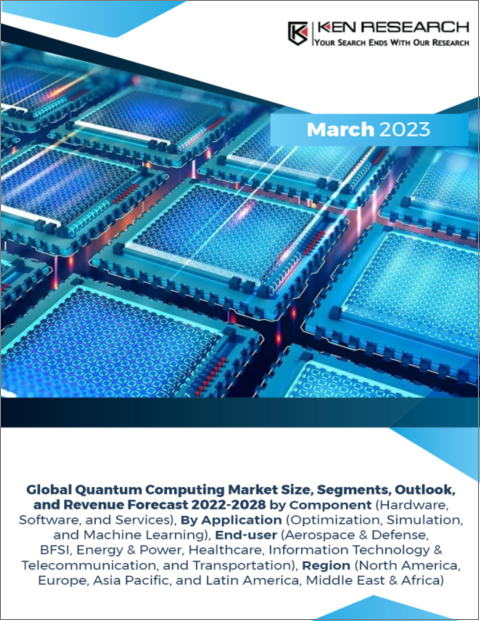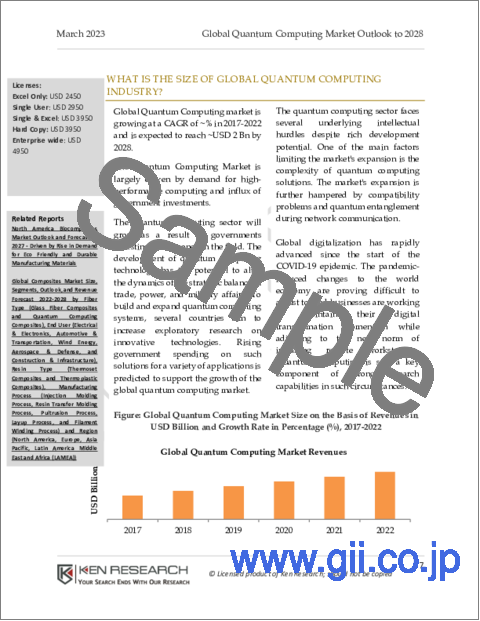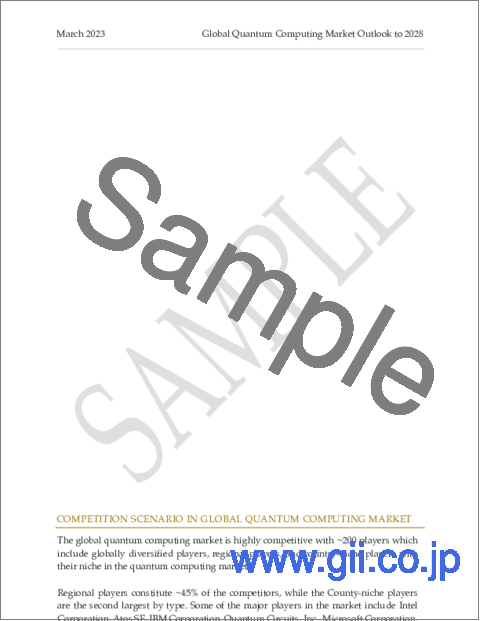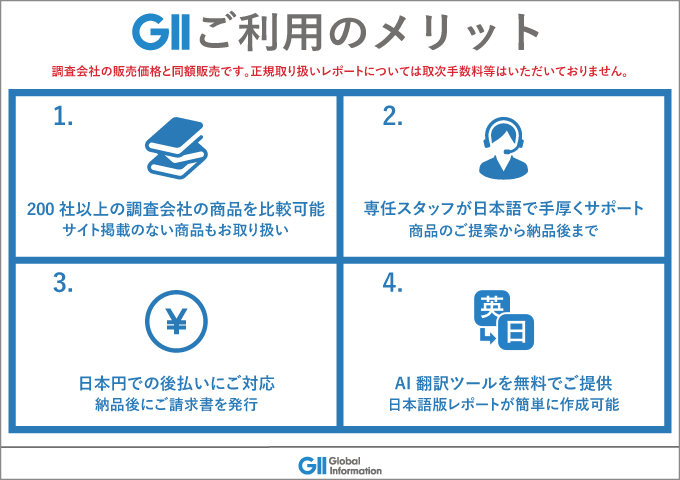|
|
市場調査レポート
商品コード
1163401
量子コンピューティングの世界市場-市場規模、セグメント、展望、収益予測:コンポーネント別、エンドユーザー別、地域別(2022年~2028年)Global Quantum Computing Market Size, Segments, Outlook, and Revenue Forecast 2022-2028 by Component, By Application, End-user, Region |
||||||
| 量子コンピューティングの世界市場-市場規模、セグメント、展望、収益予測:コンポーネント別、エンドユーザー別、地域別(2022年~2028年) |
|
出版日: 2022年11月29日
発行: Ken Research Private Limited
ページ情報: 英文
納期: お問合せ
|
- 全表示
- 概要
- 目次
世界の量子コンピューティングの市場規模は、2017年に約2億米ドル、2022年に約5億米ドルに達し、2028年には約20億米ドルに達する見込みで、予測期間中に25%のCAGRで成長すると予測されています。高性能コンピューティングの需要、様々な用途に対応するための政府支出の増加は、市場の成長を支えるものと予測されます。しかし、量子コンピューティングソリューションの複雑さ、ネットワーク通信時の互換性の問題や量子もつれは、市場の拡大を阻む要因となっています。
当レポートでは、世界の量子コンピューティング市場について調査分析し、主要な動向、競合情勢、市場分析など、体系的な情報を提供しています。
目次
第1章 エグゼクティブサマリー
- 世界の量子コンピューティング市場の成長実績と予測のハイライト
- 市場動向、課題、競合のハイライト
- 市場収益シェアのハイライト:セグメント別
第2章 市場概要と成長に影響を与える主要な動向
- 世界の量子コンピューティング市場の分類法
- 業界のバリューチェーン
- 世界の量子コンピューティング市場における主要企業のエコシステム
- 政府の規制と開発
- 市場に影響を与える主要な促進要因と課題
- COVID-19が世界の量子コンピューティング市場に与える影響
- 全世界の量子コンピューティング市場の成長実績(2017年~2021年):セグメントタイプ別
- コンポーネント別
- 用途別
- エンドユーザー別
- 地域別
- 全世界の量子コンピューティング市場の実績と予測の成長(2017年~2028年)
- 重要ポイント
第3章 世界の市場セグメンテーション、成長実績、展望、予測:コンポーネント別
- 市場の定義-セグメンテーション
- 市場収益シェア、成長実績、展望、予測(2017年~2028年):コンポーネント別
- ハードウェア
- ソフトウェア
- サービス
- 市場セグメンテーションからの重要ポイント:コンポーネント別
第4章 世界の市場セグメンテーション、成長実績、展望、予測:用途別
- 市場の定義-セグメンテーション:用途別
- 市場収益シェア、成長実績、展望、予測(2017年~2028年):用途別
- 最適化
- 機械学習
- シミュレーション
- その他
- 市場セグメンテーションからの重要なポイント:用途別
第5章 世界の市場セグメンテーション、成長実績、展望、予測:エンドユーザー別
- 市場の定義-セグメンテーション:エンドユーザー別
- 市場収益シェア、成長実績、展望、予測(2017年~2028年):エンドユーザー別
- 航空宇宙および防衛
- BFSI
- エネルギーと電力
- 医療
- 情報技術と通信
- 輸送
- その他
- 市場セグメンテーションからの重要なポイント:エンドユーザー別
第6章 業界/競合分析-競合情勢
- 企業(競合企業)のタイプと競合シェア
- 世界の量子コンピューティング競合のポーターのファイブフォース分析
- 市場の成長に影響を与える世界の量子コンピューティングセクターの主な開発
- 世界の量子コンピューティング市場における主要な競合の比較(2021年)
- 世界の量子コンピューティング市場における主要な競合の比較(2021年):コンポーネント範囲別
- 世界の量子コンピューティング市場における主要な競合の比較(2021年):用途範囲別
- 世界の量子コンピューティング市場における主要な競合の比較(2021年):エンドユーザー範囲別
- 世界の量子コンピューティング市場における主要な競合の比較(2021年):地域範囲別
- 競合情勢からの重要ポイント
第7章 主要な競合企業プロファイル(企業概要、タイプオファリング、強みと弱み)
- Intel Corporation
- Atos SE
- IBM Corporation
- Quantum Circuits, Inc.
- Microsoft Corporation
- Accenture
- Toshiba Corporation
- Hitachi Ltd
- Huawei
第8章 地域分析と主要地域市場の成長実績、展望、予測
- マクロ経済要因の主要地域比較
- 全世界市場収益シェア、成長実績、地域予測(2017年~2028年):地域別
- 主要地域の市場分析、成長実績、展望、予測
- 北米-量子コンピューティング市場分析
- 欧州- 量子コンピューティング市場分析
- アジア太平洋-量子コンピューティング市場分析
- ラテンアメリカ、中東、アフリカ-量子コンピューティング市場分析
第9章 業界専門家の意見/展望
- 市場の現状と将来の展望に関する業界専門家と経営幹部の注目すべき声明/引用
第10章 アナリストの推奨
- 特定された主要な機会と機会から得られる可能性のある戦略に関するアナリストの推奨事項
第11章 付録
- 調査手法-市場規模の推定、予測、および健全性チェックのアプローチ
- サンプルディスカッションガイド
- 免責事項
Market Overview
Quantum computing is a branch of computer science that uses quantum theory ideas. It is a cutting-edge technology that is quickly taking off that uses quantum mechanics to solve more challenging issues than classical computers can handle. In terms of speed, bits, and data, quantum computing has been employed for computation. While traditional computing only uses two bits-0 and 1-the system makes use of all possible states between 0 and 1, producing better results and processing data more quickly. The system's primary application is to compare various solutions and choose the best one for a challenging issue.
According to Ken Research Analysis, the Global Quantum Computing Market was valued at ~US$ 200 million in 2017. It is estimated to be ~US$ 500 million by 2022 and is expected to reach a market size of ~US$ 2000 million by 2028 growing at a CAGR of ~25% during the forecast period (2022-2028). The demand for high-performance computing is driving the growth of the quantum computing market.
Interested to Know More about this Report, Request a Sample Report (Provide Application Link)
- The quantum computing sector will grow as a result of governments investing more money in the field. The development of quantum computing technology has the potential to alter the dynamics of the strategic balance of trade, power, and military affairs. To build and expand quantum computing systems, several countries aim to increase exploratory research on innovative technologies. Rising government spending on such solutions for a variety of applications is predicted to support the growth of the global quantum computing market.
- The quantum computing sector faces several underlying intellectual hurdles despite rich development potential. One of the main factors limiting the market's expansion is the complexity of quantum computing solutions. The market's expansion is further hampered by compatibility problems and quantum entanglement during network communication.
- Global digitalization has rapidly advanced since the start of the COVID-19 epidemic. The pandemic-induced changes to the world economy are proving difficult to adjust to, and businesses are working to maintain their digital transformation momentum while adjusting to the new norm of installing remote workstations. Quantum computing is still a key component of strong research capabilities in such circumstances.
Scope of the Report
The quantum computing market is segmented by component, application, end-user. In addition, the report also covers market size and forecasts for the four region's quantum computing markets. The revenue used to size and forecast the market for each segment is US$ billion.
By Component * Hardware
- Software
- Services
By Application * Optimization
- Machine Learning
- Simulation
- Others
By End-user * Aerospace & Defense
- BFSI
- Energy & Power
- Healthcare
- Information Technology & Telecommunication
- Transportation
- Others
By Geography * North America (USA, Canada, Mexico)
- Europe (Germany, UK, France, Spain, Italy)
- Asia-Pacific (China, Japan, South Korea, India, Indonesia, Australia)
- LAMEA (Latin America, Middle East, Africa)
Leading Companies * Intel Corporation
- Atos SE
- IBM Corporation
- Quantum Circuits, Inc.
- Microsoft Corporation
- Accenture
- Toshiba Corporation
- Hitachi Ltd
- Huawei
Key Trends by Market Segment
By Component: The hardware segment held the largest market share in 2021, Since hardware represents a substantial bottleneck in the ecosystem, growth in this sector is anticipated.
- Numerous hardware platforms are being developed for quantum computing. All commercially accessible quantum computers are based on superconducting circuits and trapped ions, which are the most sophisticated. Spin qubits, photonic networks, and neutral atoms are other intriguing platforms.
By Application: The machine learning segment held the largest market share in 2021, due to the growing popularity of such computing, the machine learning segment will gain ground.
- Quantum algorithms are included in machine learning software as part of quantum machine learning. It becomes exceedingly challenging to systematically sort a large number of variables in complex models. Therefore, consumers can choose quantum computing technology to quickly and accurately resolve this complexity.
- The Monte Carlo approach, for instance, employs sampling to estimate numerical quantities from a big dataset. Algorithms can speed up the implementation of the Monte Carlo method and cut down on calculation time, whereas quantum algorithms can speed up the execution speed of a solution.
Interested to Know More about this Report, Request a Sample Report (Provide Application Link)
By End-user: BFSI segment held the largest market share in 2021, the market will grow as more of these computing systems are used in banking, financial services, and insurance.
- During the period of market forecasting for quantum computing, BFSI is anticipated to hold the largest market share. Additionally, quantum computing is gaining popularity in the healthcare industry because, according to a medical futurist, the computing technology can be used to power the development of virtual environments where experts can examine factors like body fluids, electrolytes, circulation, metabolism, and skin temperature on digitally created human replicas.
By Geography: Asia Pacific segment held the largest market share in 2021, chemicals, banking and finance, healthcare and pharmaceuticals, and other industries all have significant hubs.
- Leading producers of consumer electronics, including smartphones, laptops, and gaming consoles in APAC include nations like China, Japan, and South Korea. In these industries, there is a need to tackle difficulties in applications of simulation, machine learning, and optimization.
- Large and medium-sized businesses are developing in the region as a result of the rapid growth seen by APAC's growing economies and the increased use of cutting-edge technologies in the manufacturing industry. In consequence, this is increasing demand for quantum computing equipment and services in APAC.
Interested to Know More about this Report, Request a Sample Report (Provide Application Link)
Competitive Landscape
The global quantum computing market is highly competitive with ~200 players which include globally diversified players, regional players, and country-niche players with their niche in the quantum computing market.
Regional players constitute ~45% of the competitors, while the County-niche players are the second largest by type. Some of the major players in the market include Intel Corporation, Atos SE, IBM Corporation, Quantum Circuits, Inc., Microsoft Corporation, Google, Accenture, Toshiba Corporation, Hitachi Ltd, Huawei, and among others.
Interested to Know More about this Report, Request a Sample Report (Provide Application Link)
Recent Developments Related to Major Players
- In May 2021, the first multi-chip quantum processor in the world has been introduced by Rigetti Computing. It features a proprietary modular architecture that shortens the path to commercialization while tackling key scaling issues for fault-tolerant quantum computers.
- In January 2021, Google Quantum AI (Google) and Boehringer Ingelheim announced a collaboration agreement that would focus on implementing and researching novel applications of quantum computing in pharmaceutical research and development, particularly molecular dynamics simulations.
- In February 2021, the IBM Quantum Network and BP have reportedly joined forces, according to IBM, to support the use of quantum computing technologies in the power and energy sectors.
Conclusion
The global quantum computing market is forecasted to continue the growth that is witnessed since 2017. Quantum computing provides benefits, real-world consequences, and concerns for the automotive sector. Its applications in the automobile industry are many and are likely to address some of the major issues the sector is currently facing. This disruptive technology is related to supercomputing and high-performance computing operations. The market is highly competitive, with firms who have been there for a while taking the majority of the market. Though the market is highly competitive with ~200 players, few global players control the dominant market share and regional players also hold a significant market share.
Note: This is an On-Demand/Planned report, so the figures quoted here for a market size estimate, forecast, growth, segment share, and competitive landscape are based on initial findings and might vary slightly in the actual report. Also, any required customizations can be covered to the best feasible extent for Pre-booking clients, and the report delivered within a maximum of two working weeks.
Key Topics Covered in the Report
- Snapshot of the Global Quantum Computing Market
- Industry Value Chain and Ecosystem Analysis
- Market size and Segmentation of the Global Quantum Computing Market
- Historic Growth of the Overall Global Quantum Computing Market and Segments
- Competition Scenario of the Market and Key Developments of Competitors
- Porter's 5 Forces Analysis of the Global Quantum Computing Industry
- Overview, Type Offerings, and Strengths & Weaknesses of Key Competitors
- COVID-19 Impact on the Overall Global Quantum Computing Market
- Future Market Forecast and Growth Rates of the Total Global Quantum Computing Market and by Segments
- Market Size of End-user Segments with Historical CAGR and Future Forecasts
- Analysis of Global Quantum Computing in Major Regions
- Major Type/Supply and Consumption/Demand Hubs within Each Region
- Major Country-wise Historic and Future Market Growth Rates of the Total Market and Segments
- Overview of Notable Emerging Competitor Companies within Each Major Region
Major Players Mentioned in the Report
- Intel Corporation
- Atos SE
- IBM Corporation
- Quantum Circuits, Inc.
- Microsoft Corporation
- Accenture
- Toshiba Corporation
- Hitachi Ltd
- Huawei
Notable Emerging Companies Mentioned in the Report
- Zapata Computing, Inc.
- Strangeworks, Inc.
- Magiq Technologies Inc.
- Qxbranch, LLC
- Honeywell Inc.
Key Target Audience - Organizations and Entities Who Can Benefit by Subscribing This Report
- Quantum Computing Companies
- Quantum Computing Association
- Cloud Server Manufacturers
- Networking Equipment Manufacturers
- Research & Development Institutes for Quantum Computing
- Quantum Computing Systems Manufacturers
- Technology Research Associations
- Quantum Computing Solution Suppliers
- Quantum Computing Component Providers
- Investment Banks Targeting Quantum Computing Market
- PE and VC Firms Targeting Quantum Computing Industry
- Government Ministries and Departments of Information Technology
- Government Ministries and Departments of Communications Industry
- Potential Entrants into Quantum Computing Industry
Frequently Asked Questions
- What is the Study Period of this Market Report?
The Global Quantum Computing Market is covered from 2017-2028 in this report, which includes a forecast for the period 2022-2028.
- What is the Future Growth Rate of the Global Quantum Computing Market?
The Global Quantum Computing Market is expected to witness a CAGR of about 25% over the next six years.
- What are the Key Factors Driving the Global Quantum Computing Market?
Rising government spending on such solutions for a variety of applications is predicted to support the growth of the Global Quantum Computing Market.
- Which is the Largest Application Segment within the Global Quantum Computing Market?
The machine learning segment held the largest market share in 2021, due to the growing popularity of such computing, the machine learning segment will gain ground.
- Who are the Key Players in the Global Quantum Computing Market?
Intel Corporation, Atos SE, IBM Corporation, Quantum Circuits, Inc., Microsoft Corporation, Google, Accenture, Toshiba Corporation, Hitachi Ltd, Huawei, and others are the major companies operating in Global Quantum Computing Market.
Table Of Contents
Scope:
1. Executive Summary
- 1.1 Highlights of Global Quantum Computing Market Historic Growth & Forecast
- 1.2 Highlights of Market Trends, Challenges, and Competition
- 1.3 Highlights of Market Revenue Share by Segments
2. Market Overview and Key Trends Impacting Growth
- 2.1 Global Quantum Computing Market Taxonomy
- 2.2 Industry Value Chain
- 2.3 The Ecosystem of Major Entities in the Global Quantum Computing Market
- 2.4 Government Regulations & Developments
- 2.5 Key Growth Drivers & Challenges Impacting the Market
- 2.6 COVID-19 Impact on Global Quantum Computing Market
- 2.7 Total Global Quantum Computing Market Historic Growth by Segment Type, 2017-2021
2.7.1 By Component
2.7.2 By Application
2.7.3 By End-user
2.7.4 By Regions
- 2.8 Total Global Quantum Computing Market Historic & Forecast Growth, 2017-2028
- 2.9 Key Takeaways
3. Total Global- Market Segmentation by Component, Historic Growth, Outlook & Forecasts
- 3.1 Market Definition - Segmentation by Component
- 3.2 Market Revenue Share, Historic Growth, Outlook, and Forecasts by Component, 2017-2028
3.2.1 Hardware
3.2.2 Software
3.2.3 Services
- 3.3 Key Takeaways from Market Segmentation by Component
4. Total Global- Market Segmentation by Application, Historic Growth, Outlook & Forecasts
- 4.1 Market Definition - Segmentation by Application
- 4.2 Market Revenue Share, Historic Growth, Outlook, and Forecasts by Application, 2017-2028
4.2.1 Optimization
4.2.2 Machine Learning
4.2.3 Simulation
4.2.4 Others
- 4.3 Key Takeaways from Market Segmentation by Application
5. Total Global- Market Segmentation by End-user, Historic Growth, Outlook & Forecasts
- 5.1 Market Definition - Segmentation by End-user
- 5.2 Market Revenue Share, Historic Growth, Outlook, and Forecasts by End-user, 2017-2028
5.2.1 Aerospace & Defense
5.2.2 BFSI
5.2.3 Energy & Power
5.2.4 Healthcare
5.2.5 Information Technology & Telecommunication
5.2.6 Transportation
5.2.7 Others
- 5.3 Key Takeaways from Market Segmentation by End-user
6. Industry / Competition Analysis - Competitive Landscape
- 6.1 Types of Players (Competitors) & Share of Competitors
- 6.2 Porter's 5 Forces Analysis of Global Quantum Computing Competitors
- 6.3 Key Developments in the Global Quantum Computing Sector Impacting Market Growth
- 6.4 Comparison of Leading Competitors within the Global Quantum Computing Market, 2021
- 6.5 Comparison of Leading Competitors within the Global Quantum Computing Market by Coverage of Component Segments, 2021
- 6.6 Comparison of Leading Competitors within the Global Quantum Computing Market by Coverage of Application Segments, 2021
- 6.7 Comparison of Leading Competitors within the Global Quantum Computing Market by Coverage of End-user Segments, 2021
- 6.8 Comparison of Leading Competitors within the Global Quantum Computing Market by Coverage of Region, 2021
- 6.9 Key Takeaways from Competitive Landscape
7. Key Competitor Profiles (Company Overview, Type Offerings, and Strengths & Weaknesses)
- 7.1 Intel Corporation
- 7.2 Atos SE
- 7.3 IBM Corporation
- 7.4 Quantum Circuits, Inc.
- 7.5 Microsoft Corporation
- 7.6 Google
- 7.7 Accenture
- 7.8 Toshiba Corporation
- 7.9 Hitachi Ltd
- 7.10 Huawei
8. Geographic Analysis & Major Region Market Historic Growth, Outlook, and Forecasts
- 8.1 Major Region Comparison of Macroeconomic Factors
- 8.2 Total Global- Market Revenue Share, Historic Growth, Outlook and Forecasts by Geography, 2017-2028
- 8.3 Major Region Market Analysis, Historic Growth, Outlook & Forecasts
- 8.4 North America - Quantum Computing Market Analysis
8.4.1 Major Production and Consumption Hubs in North America
8.4.2 Notable Emerging Quantum Computing Companies in North America
8.4.3 Market Revenue Share, Historic Growth, Outlook, and Forecasts by Component, 2017-2028
8.4.4 Market Revenue Share, Historic Growth, Outlook, and Forecasts by Application, 2017-2028
8.4.5 Market Revenue Share, Historic Growth, Outlook, and Forecasts by End-user, 2017-2028
8.4.6 Market Revenue Share, Historic Growth, Outlook, and Forecasts by Major Countries, 2017-2028
- USA
- Canada
- Mexico
- 8.5 Europe - Quantum Computing Market Analysis
8.5.1 Major Production and Consumption Hubs in Europe
8.5.2 Notable Emerging Quantum Computing Companies in Europe
8.5.3 Market Revenue Share, Historic Growth, Outlook, and Forecasts by Component, 2017-2028
8.5.4 Market Revenue Share, Historic Growth, Outlook, and Forecasts by Application, 2017-2028
8.5.5 Market Revenue Share, Historic Growth, Outlook, and Forecasts by End-user, 2017-2028
8.5.6 Market Revenue Share, Historic Growth, Outlook, and Forecasts by Major Countries, 2017-2028
- Germany
- UK
- France
- Spain
- Italy
- Rest of Europe
- 8.6 Asia-Pacific - Quantum Computing Market Analysis
8.6.1 Major Production and Consumption Hubs in Asia-Pacific
8.6.2 Notable Emerging Quantum Computing Companies in Asia-Pacific
8.6.3 Market Revenue Share, Historic Growth, Outlook, and Forecasts by Component, 2017-2028
8.6.4 Market Revenue Share, Historic Growth, Outlook, and Forecasts by Application, 2017-2028
8.6.5 Market Revenue Share, Historic Growth, Outlook, and Forecasts by End-user, 2017-2028
8.6.6 Market Revenue Share, Historic Growth, Outlook, and Forecasts by Major Countries, 2017-2028
- China
- Japan
- South Korea
- India
- Indonesia
- Australia
- Rest of Asia-Pacific
- 8.7 LAMEA - Quantum Computing Market Analysis
8.7.1 Major Production and Consumption Hubs in LAMEA
8.7.2 Notable Emerging Quantum Computing Companies in LAMEA
8.7.3 Market Revenue Share, Historic Growth, Outlook, and Forecasts by Component, 2017-2028
8.7.4 Market Revenue Share, Historic Growth, Outlook, and Forecasts by Application, 2017-2028
8.7.5 Market Revenue Share, Historic Growth, Outlook, and Forecasts by End-user, 2017-2028
8.7.6 Market Revenue Share, Historic Growth, Outlook, and Forecasts by Major Sub-Regions, 2017-2028
- Latin America
- Middle East
- Africa
9. Industry Expert's Opinions/Perspectives
- 9.1 Notable Statements/Quotes from Industry Experts and C-Level Executives on Current Status and Future Outlook of the Market
10. Analyst Recommendation
- 10.1 Analyst Recommendations on Identified Major Opportunities and Potential Strategies to Gain from Opportunities
11. Appendix
- 11.1 Research Methodology - Market Size Estimation, Forecast, and Sanity Check Approach
- 11.2 Sample Discussion Guide
- 11.3 Disclaimer




